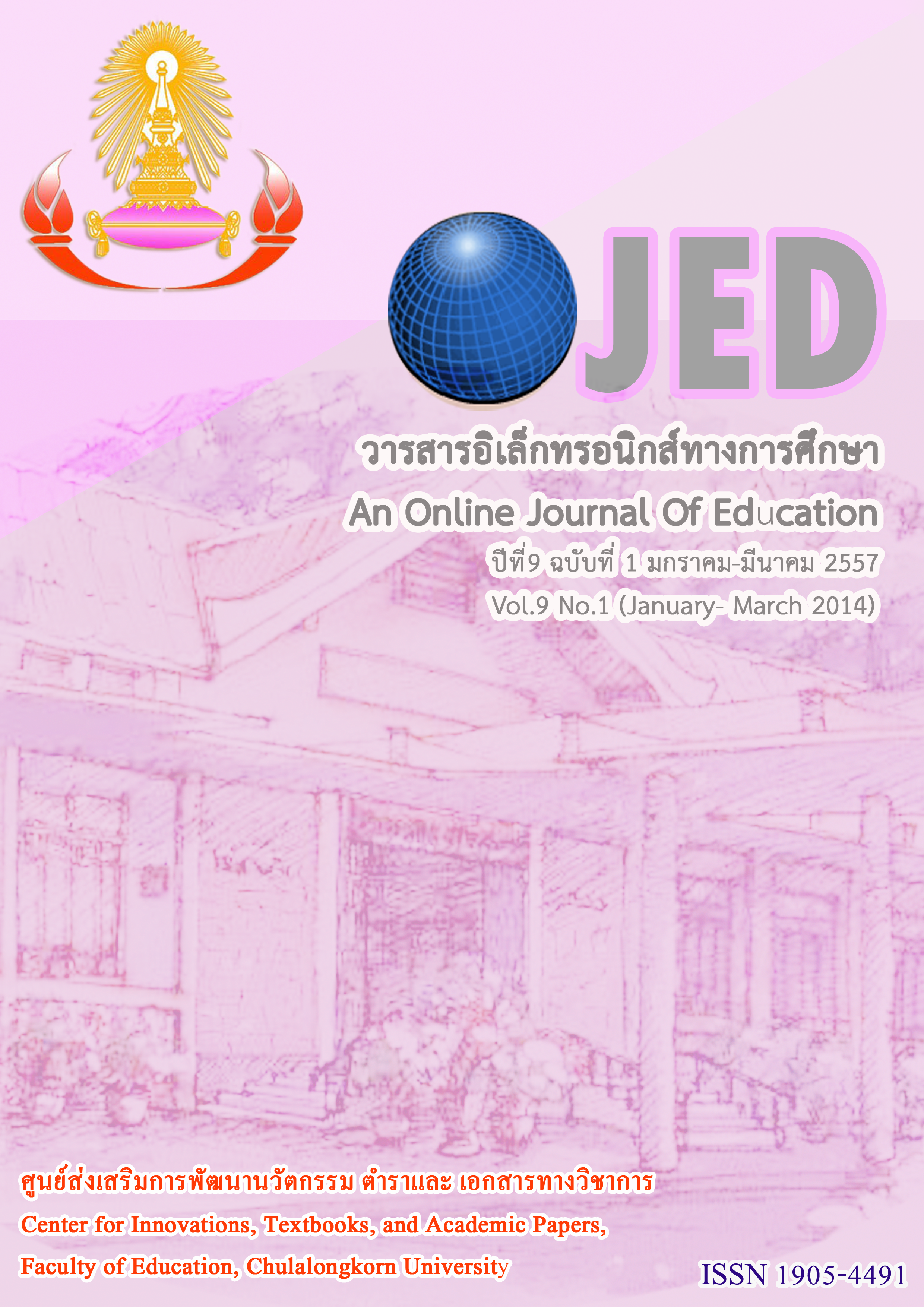ผลของการจัดกิจกรรมการเรียนรู้คณิตศาสตร์โดยใช้โมเดลการแก้ปัญหาที่เน้นกระบวนการกำกับทางปัญญาที่มีต่อความสามารถในการแก้ปัญหาคณิตศาสตร์และความสามารถในการคิดอย่างมีวิจารณญาณของนักเรียนมัธยมศึกษาปีที่ 2 EFFECTS OF ORGANIZING MATHEMATICS LEARNING ACTIVITIE
Keywords:
โมเดลการแก้ปัญหาที่เน้นกระบวนการกำกับทางปัญญา, ความสามารถในการแก้ปัญหาคณิตศาสตร์, ความสามารถในการคิดอย่างมีวิจารณญาณ, PROBLEM SOLVING MODEL OF METACOGNITIVE PROCESS, MATHEMATICS PROBLEM SOLVING ABIBLITY, CRITICAL THINKING ABILITYAbstract
การวิจัยครั้งนี้มีวัตถุประสงค์ 1) เพื่อเปรียบเทียบความสามารถในการแก้ปัญหาคณิตศาสตร์และความสามารถในการคิดอย่างมีวิจารณญาณของนักเรียนที่ได้รับการจัดกิจกรรมการเรียนรู้คณิตศาสตร์โดยใช้โมเดลการแก้ปัญหาที่เน้นกระบวนการกำกับทางปัญญาระหว่างก่อนเรียนและหลังเรียน 2) เพื่อเปรียบเทียบความสามารถในการแก้ปัญหาคณิตศาสตร์และความสามารถในการคิดอย่างมีวิจารณญาณของนักเรียนระหว่างกลุ่มที่ได้รับการจัดกิจกรรมการเรียนรู้คณิตศาสตร์โดยใช้โมเดลการแก้ปัญหาที่เน้นกระบวนการกำกับทางปัญญากับกลุ่มที่ได้รับการจัดกิจกรรมการเรียนรู้คณิตศาสตร์แบบปกติ 3) เพื่อศึกษาความสามารถในการแก้ปัญหาคณิตศาสตร์และความสามารถในการคิดอย่างมีวิจารณญาณของนักเรียนที่ได้รับการจัดกิจกรรมการเรียนรู้คณิตศาสตร์โดยใช้โมเดลการแก้ปัญหาที่เน้นกระบวนการกำกับทางปัญญา กลุ่มตัวอย่างเป็นนักเรียนชั้นมัธยมศึกษาปีที่ 2 โรงเรียนหอวัง ภาคเรียนที่ 1 ปีการศึกษา 2556 จำนวน 108 คน เป็นนักเรียนกลุ่มทดลอง 54 คน และนักเรียนกลุ่มควบคุม 54 คน โดยนักเรียนกลุ่มทดลองได้รับการจัดกิจกรรมการเรียนรู้คณิตศาสตร์โดยใช้โมเดลการแก้ปัญหาที่เน้นกระบวนการกำกับทางปัญญา และนักเรียนกลุ่มควบคุมได้รับการจัดกิจกรรมการเรียนรู้คณิตศาสตร์แบบปกติ ผลการวิจัยพบว่า 1) นักเรียนกลุ่มทดลองมีความสามารถในการแก้ปัญหาคณิตศาสตร์และความสามารถในการคิดอย่างมีวิจารณญาณหลังเรียนสูงกว่าก่อนเรียน อย่างมีนัยสำคัญทางสถิติที่ระดับ .05 2) นักเรียนกลุ่มทดลองมีความสามารถในการแก้ปัญหาและความสามารถในการคิดอย่างมีวิจารณญาณสูงกว่านักเรียนกลุ่มควบคุม อย่างมีนัยสำคัญทางสถิติที่ระดับ .05 3) ความสามารถในการแก้ปัญหาคณิตศาสตร์และความสามารถในการคิดอย่างมีวิจารณญาณของนักเรียนกลุ่มทดลองมีพัฒนาการที่ดีขึ้น
The purposes of this research were: 1) to compare the mathematics problem solving and critical thinking abilities of students before and after using the problem solving model of metacognitive process; 2) to compare the mathematics problem solving and critical thinking abilities of students being taught by organizing mathematics learning activities using the problem solving model of the metacognitive process and those being taught by a conventional approach; and 3) to study the mathematics problem solving and critical thinking abilities of students being taught using the problem solving model of the metacognitive process. The subjects were 108 eighth grade students at Horwang School, in the first semester of the academic year 2013. There were 54 students in the experimental group and the other 54 students in the control group. The experimental group was taught by using the problem solving model of the metacognitive process, while the control group was taught by the conventional approach. The result of the study revealed that: 1) the mathematics problem solving and critical thinking abilities of students in the experimental group, after the experiment, were statistically higher than those before at the .05 level of significance; 2) the mathematics problem solving and critical thinking abilities of students in the experimental group were higher than those of students in the control group at the .05 level of significance; and 3) the mathematics problem solving and critical thinking abilities of students in the experimental group were developed in a positive direction.




